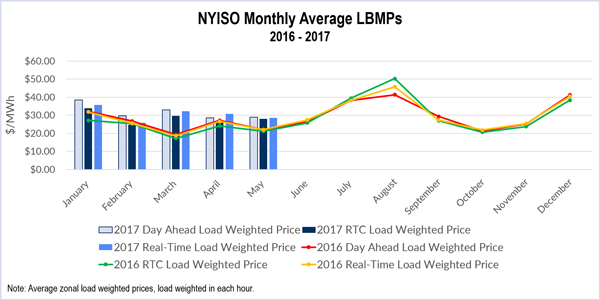BOLTON LANDING, N.Y. — NYISO said Tuesday that it declared a major emergency on May 21 during the hour beginning 5 p.m. after the loss of 1,000 MW of generation in ISO-NE caused the Central East interface flow to exceed its voltage collapse limit.
It was the second major emergency declaration in a month after one in April, also stemming from interface flow problems. NYISO had last declared a major emergency in July 2016.
Wes Yeomans, NYISO vice president of operations, presented the ISO’s May 2017 operations report during a June 13 Management Committee. The report showed that last month’s peak load of 25,578 MW occurred May 18 and that the month saw more than nine hours of thunderstorm alerts.
The grid operator reported that Lower Hudson Valley installed capacity (ICAP) prices for June fell by 27 cents month over month to $10.01/kW-month, while New York City was down by 33 cents to $10.24. Both declines stemmed from increases in generator unforced capacity available and a decrease in unoffered megawatts. The New York Control Area ICAP price meanwhile increased by $2.17 to $3.89, primarily because of reduced imports and increased exports.
Natural Gas down a Penny from April, up 76% from 2016
In his CEO/COO report to the Management Committee, NYISO COO Rick Gonzales noted that the ISO’s May average year-to-date monthly energy cost of $36.54/MWh represented a 22% increase from May 2016. The average locational-based marginal price for May was $31.74/MWh, compared with $23.31/MWh a year earlier.

| NYISO
May natural gas prices on the Transco Z6 pipeline serving New York City were down a penny from the prior month to $2.80/MMBtu but up 76.5% year over year. The grid operator’s average daily sendout was 383 GWh/day in May, compared with 377 in April and 397 in May 2016.
May distillate prices were down compared to the previous month but up 7.4% year on year. Total uplift costs were higher than in April, while costs per megawatt-hour fell. The local reliability share for uplift was 24 cents/MWh, up from 20 cents/MWh in April, and the statewide share was -13 cents/MWh, down from -8 cents/MWh.
New Testing Requirement for Automatic Swap Dual-Fuel Units
The Management Committee approved revisions to NYISO’s Market Services Tariff as described in the “Zone J Dual Fuel Testing Tariff Revisions” and recommended that the Board of Directors authorize filing the revisions under Section 205 of the Federal Power Act.
The New York State Reliability Council Rule G2 R4 requires combined cycle units in Zone J (New York City) that can automatically swap fuel type to test that capability during each capability period. NYISO is updating its Services Tariff Section 4.1.9 and Ancillary Services Manual Section 8 to comply with the rule.
— Michael Kuser



